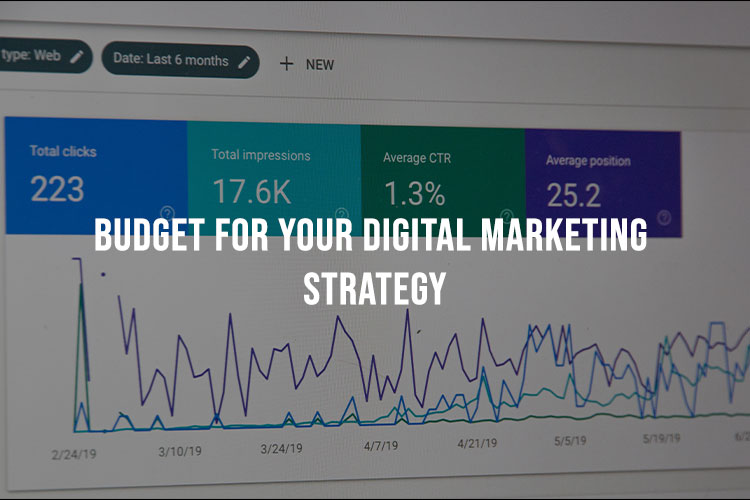Digital marketing has become oxygen to enable sustenance in the rapidly evolving and competitive business landscape of today. It is probably why 95% of businesses have increased their digital marketing budget in recent years. Most business and marketing leaders are already allocating separate budgets for things like blogging, email marketing, social media and paid marketing. They’re already doing bits and pieces of it, depending on the return on investment and budget available. Based on the Litmus report, email marketing ROI stands at 4,200%. This means, for every rupee you invest in email marketing, you’ll receive Rs. 42 in return. Another report states that blogging is 13% more likely to have a positive ROI.
As digital marketing is gaining traction, it becomes important to plan the right mix of digital marketing budget allocation strategies. Failing to have a digital marketing budget is just like aiming an axe in complete darkness. In our digital marketing world, it translates into a wastage of money, time and effort. Here is a holistic approach to designing a digital marketing budget to consistently increase awareness, generate leads and meet sales goals.
But, why is it so important to allocate a budget for your digital marketing activities?
Know the scene from ‘Wolf of the wall street’ when Leonardo Dicaprio throws money in the street? That is exactly what you should not do with digital marketing. Even if you have that much money, budget your digital marketing activities to avoid running on empty soon.
So what is budgeting for digital marketing activities exactly? Simply put, it is a set amount that a company uses only for its digital marketing activities such as SEO, PPC, Social Media Marketing, Website Development, etc. Now, the question that arises is why budgeting for digital marketing activities is important?
A digital marketing budget actually serves many purposes, but mainly helps you attain a clear direction and track your efforts to share. We have listed a few compelling reasons in favour of budgeting for digital marketing activities.

Our tailored customer-centric approach in marketing maximizes sales.
Search Engine Marketing:Drive traffic, boost conversions & grow your business
Social Media Marketing:Maximize your social media potential & engage with your audience
LinkedIn Marketing:Unlock the power of LinkedIn!
Video Production & Photography:Elevate your business with captivating visuals
Avoids overspending and underspending
Are marketers spending too much on digital marketing? The simple answer is yes. In the U.S. $6 of every $10 of media spending is already allocated to digital. According to a survey done by eMarkters, an average of 26% of marketing budgets are wasted on ineffective strategies or channels. A marketing budget is just like a yardstick with which you can easily measure their ROI and easily plan your marketing expenses.
Brings clarity to the allocation of funds
Digital marketing is deep. There is SEO, content marketing, social media marketing, paid marketing and a lot more. Budgeting for these digital marketing activities will give you a clear insight into your budget allocations across different channels. Suppose you get a higher return on investment from Facebook than Google Ads, you can simply allocate more funds to that channel which gives you optimal revenue.
Gives you a clear picture of the return on investment
While budgeting for digital marketing activities, you will take into account the latest marketing trends. Doing so will help you with customer acquisition and provide the desired return on investment.
Sustain your business growth and profitability
A successful marketer knows that a marketing budget is not just a cost but an effective investment into business growth. Allocating funds to your digital marketing activities will help utilise funds wisely and churn out the maximum results.
How does your budget link to your marketing strategy?
To earn something you’ve got to give something. Marketing experts say money carefully invested in marketing can have a high return on investment, provided that they are backed with the right strategies. This can be especially true in the case of digital marketing because the cost of entry is often much lower than other channels like broadcasting, printing, etc.
Typically you should invest anywhere from 3-10% of your annual revenue on marketing. If your annual revenue is 10 lakh, around Rs. 30,000 to Rs. 100,000 should be invested in your marketing efforts. As digital marketing is growing and is likely to give a better return on investment, half of your annual marketing budget should be dedicated to digital marketing.
Digital marketing does not only consist of your advertising efforts. Essential elements such as website development, search engine optimization, copywriting, social media marketing and planning are aspects that fall under the marketing budget.
Having a dedicated digital marketing budget not only has the potential to expand your consumer base but also establish your business as a reliable and trustworthy brand. Additionally, if your business goals are set at the top of your priority pyramid, a dedicated budget can help you tie your marketing with business goals and keep tracking the progress along the way. The marketing budget will outline exactly how much you want to spend on various activities that fall under the digital marketing umbrella. A digital marketing budget gives you clear insights so you can drop unprofitable campaigns and invest more into those that pay something.
Digital marketing budgets are a little different because the digital space is full of channels. Therefore, developing a digital marketing budget can be an overwhelming and tedious task. When planning a marketing budget, there are a lot of things to be considered and if you miss out on anything by chance, it can have catastrophic results.
Thankfully, there are several budget techniques that you can implement for a good start.
Let’s check out the most effective methods for budgeting your digital marketing activities
The average marketing budget differs from one industry to another. Let’s take a look at how this method applies, along with other budgeting techniques that are effective and result-driven.
The 70-20-10 budgeting rule
It is always tempting to stick to the tried-and-tested budget methods that generated revenue in the past. However, in digital marketing, the scenario is different. Regardless of your industry, 70% of your annual marketing budget should be spent on standard digital marketing activities that have yielded successful results in the past, for example, search engine optimization and affiliate marketing for retailers. Whichever activity falls under this section, should already be successful. Additionally, 20% of the annual digital marketing budget should be dedicated to activities that are new to your business but are result-driven and automated in response. Putting money into innovation helps your business thrive & grow. The remaining 10% of your marketing budget needs to be responsive, agile and more experimental. A small portion of 10% of time & money should be invested in evolving technologies and strategies to stay ahead in the competitive landscape.
Profit-focused budgeting
This is another effective budgeting technique which primarily focuses on your marketing efforts for the most-earning campaigns. While implementing this technique, your marketing budget should highlight two things: the type of marketing campaign you’ll be running and how profitable they are to your business.
You can get better insights by filling out some basic details in the following table.
| Campaign | Method | Number of leads | Cost per leads | Budget needed | Months to mature | Average annual profit per lead (Rs. 100) | Customer lifetime value
(Rs. 500) |
| Google Ads | Foundation | 100 | Rs. 70 | Rs. 7,000 | 1 | Rs. 3,000 | Rs. 53,000 |
| SEO | Foundation | 100 | Rs. 35 | Rs. 3,500 | 6 | Rs. 6,500 | Rs. 56,500 |
| Social Media | Supplemental | N/A | unknown | Rs. 500 | 3 | Rs. 0 assumed | Rs. 0 assumed |
| Content marketing | Supplemental | N/A | unknown | Rs. 500 | 3 | Rs. 0 assumed | Rs. 0 assumed |
This marketing budget provides insights as follow:
- Which campaigns you are investing in
- Which campaigns are profitable amongst foundational and supplemental methods
- How many leads do you need from each campaign to earn profits
- Whether or not you should increase your budget
- How long each campaign takes to mature
Along with these two popular budgeting methods, there are percentage methods, goal-and-task methods, what’s in my wallet method and so on. You can also adjust your budgeting techniques depending on the activities you have in the campaign.
If you want optimal results you cannot miss out on the following things while budgeting for digital marketing activities
Budgeting for digital marketing activities today is way different than it was earlier. As you start budgeting for digital marketing in 2022, you should consider the following activities, identify the main marketing channels and align as per relevancy.
- Search engine optimisation
- Pay per click advertising
- Email marketing
- Social media marketing
Analyse the results to check what is working and what is not
So you have just allocated a huge fund to digital marketing. Now the next step is to see what has worked and what has not. Even if you have planned the finest details, there are many elements of surprise. The only way to eliminate unforeseen results is to always measure your performance across all channels. Some of the factors that you should measure are cost per acquisition and lifetime value.
Tracking the performance of your marketing budget will give you insights that you can further use to allocate your digital marketing budget more effectively.
Strategising, budgeting and executing your marketing strategy is a mammoth task. If you’d like to work with a digital marketing agency that can help with the entire process, Brego Business can help. Reach out to us by dropping in your details on our website, or direct message us here!



